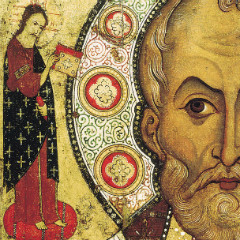
The memory of few saints is as cherished as that of St. Nicholas. Known as Nicholas the Wonderworker, he is remembered in the church on December 6 and closely associated with the Christmas season.
While the legends around this humble bishop have swollen beyond recognition, the popular picture of the jolly fat man circling the globe dropping gifts to worthy children has some slender basis in fact.
According to the tradition of the church, Nicholas was born at the end of the third century to a wealthy but long-barren couple in Patara, Lycia, a significant harbor town along Turkey’s Mediterranean coast. Because of his parents’ age, Nicholas was young when they passed and bequeathed him the family fortune.
Exceptionally devout, Nicholas now added almsgiving to his regular disciplines of fasting and prayer, generously helping the needy.
In one of the more famous stories about him, Nicholas heard of three young women whose destitute father could not muster dowries for their prospective husbands. Unable to marry, it seemed inevitable that slavery or even prostitution would be the girls’ only way forward.
On three successive nights Nicholas took enough gold coins for each of the girl’s needs and threw them into the family’s open window, whereupon they landed in their laundered stockings, drying over the hearth. He was eventually found out, but Nicholas tried to keep his gift-giving secret.
Many such stories about the saint have been embellished and even fabricated in the centuries since his earthly sojourn. But perhaps we haven’t paid enough attention to one simple gift he offered then and gives us still.
St. Nick’s best gift is prayer.
The commemorative hymn sung on his feast day closes with a line common all such songs: “Pray to Christ our God to save our souls.” The intercession of Nicholas and rest of the saints around God’s throne is one of the greatest gifts offered God’s people.
Some Christians no longer see it that way. In his Institutes, for instance, John Calvin calls the intercession of the saints a “fiction” and asks “what angel or devil ever announced one syllable to any human being concerning that fancied intercession of theirs? There is not a word on the subject in Scripture” (3.20.21).
Not exactly. In the second book of Maccabees, Judas Maccabeus has a vision of the high priest Onias and the prophet Jeremiah praying for Israel. Jeremiah is introduced as “a man who loves the brethren and prays much for the people of the holy city” (15.14).
Importantly, the Maccabean books were read and received by the early church — the same church in which and to which John wrote his Apocalypse, which likewise presents us a vivid picture of this intercession. In Revelation 5 we see the twenty-four elders (in heaven) offering the prayers of the saints (still on earth) at the throne of the Lord (v. 8), and then in the next chapter we see the martyrs crying out to God as well (6.9).
This sort of intercession was assumed by these biblical writers and assumed by the Christians who read and heard the biblical witness.
Not only do you find additional references affirming the doctrine in the writings of the ancient bishops and teachers of the church, but the belief was popularly held as well. Catacomb graffiti in Rome, for instance, features “prayer requests” to the Apostles Peter and Paul and many other saints and martyrs. Herbert A. Musurillo gives several examples in The Fathers of the Primitive Church:
Peter and Paul, pray for Victor!
Paul and Peter, remember Sozomen and whoever reads this!
Paul and Peter, pray for Nativus forever!
I’m with the early church on this one. I see the prayers of the saints in the scripture, observe its place in the experience and life of the church, and assume it’s true. I fear Calvin, overreacting to Rome, forfeited something of great value.
So where does this leave us with Nicholas?
Given his gracious and merciful character, demonstrated by his gifts to the needy, I imagine his prayers go far beyond just the worthy kids. Unlike Santa Claus, St. Nick gives his best gift to both the naughty and the nice, because we’re all needy.












